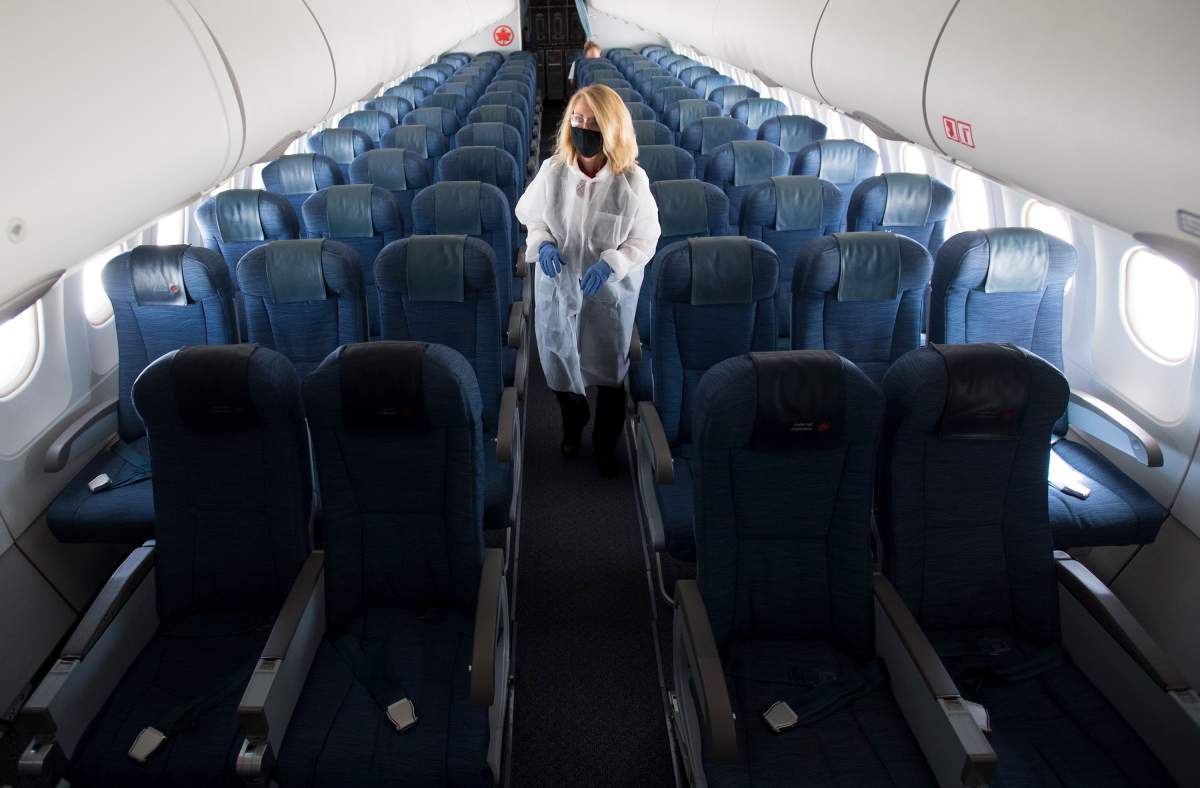The message at the end of an email from a senior Canadian government official was blunt.

It came in response to an airline industry worker who had repeatedly asked for more information about the coronavirus-related dangers tied to their job.
According to their union, the worker had previously refused to work on March 21 over fears of COVID-19, the disease caused by the virus, but officials from two federal departments, Transport Canada and Employment and Social Development Canada (ESDC), concluded on March 29 — with most of the country in lockdown over the pandemic — that this employee was not in danger.
Two weeks later, the chief of national flight operations at Transport Canada, Pierre Clément, told the worker in the email that the government hadn’t finished investigating the complaint. Clément also suggested the employee should stop asking the government about the matter.
“I would kindly ask you to cease and desist from communicating with my staff… regarding this as the investigation is underway,” Clément told the worker in an April 14 email reviewed by Global News. “Please consult your union if you need further (information).”
The email was released by the worker’s union, which withheld the employee’s name in order to protect their privacy.
The case is one of at least 47 work refusals involving Canadians who fall under federal labour legislation and have refused to work due to COVID-19 concerns, according to statistics released to Global News by the ESDC.
- ‘Something just went off’: Canadians in Middle East describe ‘surreal’ Iran missile strikes
- Carney and India’s Modi strike new energy partnership
- As Iran conflict spirals, there are 85K Canadians in Middle East, GAC says
- Danielle Smith says Iran war underscores need for new Alberta pipeline to the coast
About one million workers across Canada fall under the Canada Labour Code (CLC), including workers in the airline industry and other transportation-related jobs as well as those in pipelines, telecommunications and banking.
But federal officials confirmed that they found dangerous situations in only three out of the 47 work refusal cases. Officials also concluded there was no danger in 41 cases, and they deemed two other cases to be inadmissible. For the remaining case, officials deemed that the work refusal related to the normal conditions of the person’s employment.
The three cases deemed to be dangerous involved flight attendants on commercial planes, where it is difficult to maintain distance from other workers or passengers on board.

Along with thousands of other coronavirus-related workplace complaints and investigations under provincial legislation, the federal cases highlight some of the challenges regulators face in their efforts to protect workers and other members of the public from the spread of COVID-19. Many stakeholders note that the regulators must apply the health and safety provisions of labour laws that were never designed for a pandemic in which people are required to stay at least two metres apart.
“I think what the pandemic has exposed is how absolutely weak and pathetic the labour laws are,” said Deena Ladd, executive director of Workers’ Action Centre, a non-profit Toronto-based organization that provides support and advice to people about their rights in the workplace.

Get daily National news
The situation has also created challenges for workers, including the airline employee on the receiving end of Clément’s “cease and desist” email. The employee wanted to review the inspector’s findings and appeal the government’s decision, but according to their union, they were not initially given access to the investigation report.
Under the CLC, workers have 10 days to appeal a ruling about a work refusal after they are notified of the government’s decision.
But Clément said in his mid-April email, more than two weeks after federal officials gave their notice that the employee wasn’t in danger, that they were still writing a series of reports about work refusals, including the one requested by the employee. Clément added that these reports would need to be “vetted” over the coming days.
“Since mid-March, my team, working with ESDC Labour Program, have been dealing with multiple work refusals,” Clément wrote in the email. “The impetus is on investigating each to determine whether the employee is in danger as defined by Part II of the CLC. That is our priority during this rather unprecedented time in aviation history.”
The worker in question eventually got the investigation report on April 17, according to their union, and has filed their appeal.
Clément did not respond to questions from Global News about why he asked the worker to “cease and desist” and why reports were still being vetted after investigators had ruled on whether there was danger in the workplace. But Transport Canada said in a statement that it takes “the safety and security of Canadians very seriously.”
The Canadian Union of Public Employees (CUPE), which represents more than 10,000 flight attendants across Canada, says it isn’t convinced that the department is prioritizing health and safety.
Prior to the pandemic, the union had battled with airlines and the regulator over efforts to change regulations setting the minimum ratio of flight attendants needed to ensure the safety of all passengers aboard flights.
After COVID-19 cases started to spread in Canada, Troy Winters, a senior health and safety officer at the union, said there were at least 10 cases in which an investigator determined there was no danger in the workplace without interviewing the employee who had exercised their right to refuse work due to health and safety concerns.
“We’ve basically lost all faith in Transport Canada to be a fair regulator of health and safety within the airline industry,” Winters said in an interview. “COVID has just exacerbated this. It’s not like this started with COVID. It just got worse under COVID.”

Transport Canada, which investigated at least 21 work refusal cases, explained it could not respond to detailed questions about its investigations since some files remain active and under appeal.
“As such, there are constraints on what the department is legally allowed to say publicly during the refusal to work process,” department spokesman Alexandre Desjardins said in an email to Global News. “That position is to ensure that the process is completed in a way that enables a fair outcome for all parties.”
Transport Canada also referred general questions about its workplace investigations to ESDC. That department said on June 16 that it would need a few days to provide responses.
Stakeholders, such as Ladd from the Workers’ Action Centre and Linda Vannucci, a lawyer and co-director of the Toronto-based Workers’ Health and Safety Legal Clinic, said they were disappointed to hear the union’s allegations about inspections that had failed to involve interviews with the workers.
“That’s really quite shocking,” said Vannucci.
Wayne Lewchuk, an emeritus faculty professor of labour studies at McMaster University, said that government regulators are likely struggling to balance the protection of worker health and safety with pressure to prevent the entire economy from shutting down.
“Obviously, hearing the voice of the person who makes the complaint is pretty critical, but it doesn’t always happen. That’s the reality,” Lewchuk said in an interview. “There’s only so many inspectors to go around, and the employers are not happy when production gets interrupted for any reason because of a work refusal so they’re keen to get this resolved quickly.”
For many workers, the right to refuse work is a last resort after other complaints or attempts to improve health and safety in the workplace have failed.
Winters from CUPE said the regulator has the power to change company behaviour by confirming when it observes dangerous conditions and taking action.
He believes this is what happened in the case of Air Canada, which was subject to a March 20 safety order in Montreal over three work refusal investigations that confirmed flight attendants were in danger.
The investigation order, reviewed by Global News, concluded that “requiring flight attendants to come frequently into close proximity with passengers during the COVID-19 outbreak, in order to provide regular service, with no possibility of social distancing presents a serious threat to their health.” The government also ordered the airline “to alter the activity that constitutes the danger immediately.”
Around that time, Winters said Air Canada started offering N95 masks to its employees and increased its efforts to consult with the union about safety measures.

CUPE estimates that more than 60 of its members were infected with the coronavirus in the early weeks of the pandemic but that infection rates dropped as airlines started to distribute more protective gear and as air traffic started to decrease.
Since March, more than 400 flights, operated by multiple airlines, have taken off or landed in Canada with at least one person who had COVID-19, according to government data compiled by the union.
This includes dozens of flights since the beginning of May as well as a few flights in June with at least one passenger infected with the virus.
Air Canada told Global News in a statement that it was already starting to exceed the requirements of the March 20 safety order before the government confirmed the danger. The airline also said it has implemented a multi-layered approach to protect both passengers and employees through screening and protective gear.
“As the understanding of the risks and effective precautions against COVID-19 increased, Air Canada provided PPE (personal protective equipment) to its employees, including masks, gloves, goggles and gowns,” said Air Canada spokeswoman Pascale Déry. “We were also one of the first airlines in the world to make face coverings mandatory for both flight attendants and customers.”
The airline’s approach also combines screening measures and protective gear, along with other changes to limit contact on board, rigorous cleaning and disinfection as well as contact tracing, she said.
“We also continue to explore additional measures as these processes and technologies become available,” she added.
— With files from Andrew Russell









Comments
Want to discuss? Please read our Commenting Policy first.